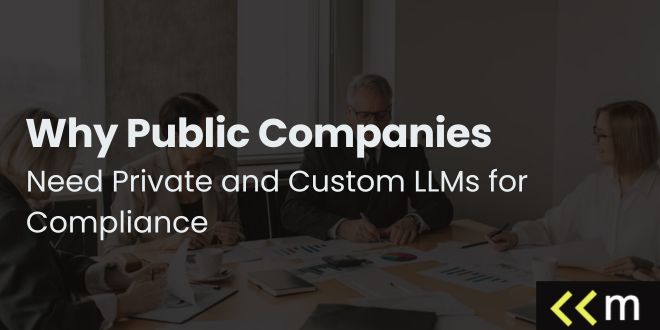The Hidden Risks of Public AI APIs—and How Private LLMs Solve Them

As businesses race to adopt artificial intelligence, many are turning to public AI APIs like OpenAI’s GPT-4, Anthropic’s Claude, or Google’s Gemini.
These AI models offer powerful capabilities out of the box—language understanding, text generation, summarization, and more—without the need to host or manage infrastructure.
On the surface, they’re convenient, scalable, and cost-effective.
But behind that convenience lie serious, often unspoken security risks.
For enterprises handling sensitive data, relying on public APIs could expose them to privacy violations, vendor lock-in, unpredictable costs, and compliance failures. As the need for AI intensifies, so does the need to control it.
That’s where private LLMs come in.
What Are Public AI APIs?
Public AI APIs give developers access to powerful large language models through the cloud.
Rather than running the model locally or on your own infrastructure, you send data to a third-party provider's servers for inference and receive a response.
This approach lowers the barrier to entry.
Startups, internal teams, and even large enterprises can quickly embed AI into their workflows without setting up any infrastructure.
Popular use cases include customer support bots, content generation, code assistants, legal research, summarization, and much more.
However, this ease comes at a hidden cost.
The Hidden Risks of Public AI APIs
Beyond convenience, public model APIs expand your attack surface. Many enterprises now run more APIs than they can track, including publicly accessible and public facing integrations used by mobile apps and internal AI tools. Without an API inventory and complete visibility into API endpoints, teams often miss unknown APIs, shadow APIs, insecure APIs, or insecure endpoints sitting at the front door of the network. That gap creates API security and API security risks that are potentially leading to outages, compliance violations, and data breaches.
Data Privacy & Leakage
When using public APIs, your data flows through servers owned and operated by a third party.
Even if the provider claims to discard or anonymize data, the risk of logging, storage, or accidental retention exists. In some cases, data may be used—directly or indirectly—to improve future versions of the model.
When sensitive data, confidential data, or other sensitive information leaves your boundary, the risk of data leakage and sensitive data exposure rises, sometimes causing sensitive data exposure events that regulators treat like data breaches.
For industries like law, finance, and healthcare, this isn’t just a concern—it’s a dealbreaker. Sharing private legal documents or sensitive health data through an external API can violate client confidentiality, HIPAA, or GDPR rules.
Vendor Lock-In
Once you’ve built workflows around a specific API, switching becomes painful. Pricing changes, API version shifts, or feature deprecation can upend months of development. You’re at the mercy of the provider's roadmap, availability, and terms of service.
Lock-in becomes one of several new risks and common risks when your AI usage depends on a single provider’s AI services and pricing.
Performance Unpredictability
Public APIs are often multitenant systems—your inference jobs are queued alongside thousands of others. That means variable latency, unpredictable response times, and occasional downtime. Additionally, token-based billing can lead to budget overruns if usage scales rapidly or if responses are unexpectedly long.
Multitenant queuing also affects resource usage, and cost spikes can follow if API attacks drive unexpected volume.
Lack of Auditability
In high-stakes environments, decisions need to be explainable. But public LLMs are black boxes. You don’t control the model weights, the inference logic, or the model training process. If an AI-generated recommendation leads to a bad outcome, you may not be able to justify or audit the decision.
For regulated teams, missing audit trails are security threats and recurring security issues that a modern security team must document in security policies.
Jurisdictional & Regulatory Risks
If your provider hosts its infrastructure outside your country—or in multiple jurisdictions—you may be exposing your data to foreign surveillance laws or international transfer restrictions.
For example, EU-based companies using US-based APIs face GDPR complications around cross-border data flows.
Cross-border hosting introduces API risks and security vulnerabilities, especially those tied to local surveillance and data-transfer rules.
This is one of the main reasons many US companies are avoiding DeepSeek's AI API.
API Security Risks You Don’t See Until It’s Too Late
From an API security lens, public APIs can enable unauthorized access if API keys leak in API documentation, logs, or the development pipeline. Weak authentication and authorization, broken authentication, or missing authorization controls are common API security issue patterns attackers exploit to gain unauthorized access.
Real-world incidents show significant data breaches often start with exposed API endpoints, API request abuse, and API attacks like SQL injection attacks, cross site scripting, and other injection attacks — all engineered by malicious actors and threat actors to exploit vulnerabilities and plant malicious code. In extreme cases, attackers can trigger remote code execution, escalating an API flaw into system-wide compromise.
Attackers target API endpoints through automated API request fuzzing and layered API attacks, seeking unauthorized access and hidden API vulnerabilities. These API security failures are now AI driven, and in many orgs more than half of incident tickets relate to exposed or misconfigured APIs.
How Private LLMs Solve These Issues
Full Data Control
With private LLMs, you deploy the model inside your own infrastructure—on-premise, in your VPC, or behind your own firewall. That means no data ever leaves your network. You control what goes in, what comes out, and what gets stored.
Private LLMs allow you to bring your own data (BYOD) into the model without exposing it externally. Whether it’s internal documents, client files, contracts, or product manuals, all inputs and outputs stay within your security perimeter, reducing sensitive data exposure and preventing avoidable data breaches.
On-Premise or VPC Deployment
Private LLMs can be installed in a way that fully complies with your internal security standards—SOC 2, ISO 27001, HIPAA, etc. Whether in a single-tenant cloud environment or behind your firewall, LLM deployment is tailored to your compliance and risk requirements.
This is especially important (and difficult) in highly regulated industries like healthcare, banking, legal services, and government.
Private LLM security measures can be engineered to follow security best practices and effective security standards: keep API keys in a secret manager, enforce robust authentication and strong authentication for authorized users, and apply clear authorization mechanisms and authorization controls at the API gateway. These security controls help keep systems properly secured against API security risks, broader security risks, and evolving new vulnerabilities in AI infrastructure.
Customization & Fine-Tuning
Unlike public APIs, private LLMs can be fine-tuned on your proprietary data or integrated with Retrieval-Augmented Generation (RAG) systems to ground responses in real-time knowledge. This dramatically improves accuracy, contextuality, and trustworthiness.
You can tailor the model to your specific domain—legal terms, product SKUs, internal acronyms, or customer tone—resulting in more relevant outputs and better user experiences.
Because private deployments control AI models and machine learning pipelines, they can defend against data poisoning and prompt injection that might otherwise be allowed attackers to manipulate outputs. Public systems, by contrast, may ingest malicious data that is potentially leading to unsafe completions or AI generated code that quietly embeds flaws. Guardrails, real-time retrieval, monitored AI agents, and clear authentication and authorization reduce these API security risks and broader security threats across the supply chain.
Predictable Costs
Instead of paying per token or facing surprise API bills, private LLMs offer more predictable cost structures. Once deployed, you control compute and inference usage within your existing infrastructure or through a managed private hosting provider.
For large-scale use cases, this can reduce costs significantly while limiting cost spikes from API attacks and other security threats.
Regulatory Compliance & Auditability
Private LLM deployments allow for robust logging, monitoring, and access controls. You can enforce encryption standards, multi-factor authentication, and full audit trails. This ensures you're not only compliant—but also defensible.
You can also choose open-source AI models, where the architecture and training data are visible, enabling deeper validation and documentation.
Who Should Consider Moving to Private LLMs?
While public APIs are fine for lightweight or non-sensitive use cases, certain organizations can’t afford the risk:
- Legal firms managing sensitive case files or M&A deal docs
- Hospitals and clinics dealing with protected health information (PHI)
- Banks and fintechs subject to SOC 2, GLBA, or PCI-DSS
- Government contractors working with classified or export-controlled data
- Enterprises with unique knowledge bases, proprietary workflows, or internal IP
For these groups, data control, agentic AI customization, and compliance aren’t optional—they’re foundational. They also need a proactive posture against API security, API security risks, ongoing API attacks, and the real possibility of significant data breaches.
Conclusion
Public AI APIs offer impressive capabilities, but their hidden risks—from data privacy to vendor lock-in—can create more problems than they solve for enterprise environments. Those risks include API security risks, exposure of sensitive data, unauthorized access, and the growing frequency of data breaches driven by malicious actors.
Private LLMs offer a better path forward: secure, compliant, fully customizable AI that lives inside your walls. You control the data. You own the outcomes. You limit API risks, shrink your attack surface, and reduce the chance of future security issues.
If your organization is serious about leveraging AI without compromising trust, compliance, or control—then it’s time to go private.
Want to deploy your own private LLM? Contact us at LLM.co to get started with a secure, scalable, and compliant AI solution tailored to your needs.
Nate Nead is the founder and CEO of LLM.co where he leads the development of secure, private large language model solutions for enterprises. With a background in technology, finance, and M&A, Nate specializes in deploying on-prem and hybrid AI systems tailored to highly regulated industries. He is passionate about making advanced AI more accessible, controllable, and compliant for organizations worldwide.







